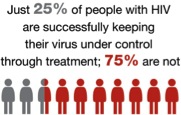No Glove, No Love!
By. Jewel Jefferies
In today’s society there are many global issues such as teen pregnancy, poverty, and foreclosure. However, The Center for Disease Control (CDC) reports that more than 1.1 million people in the United States are HIV positive, and almost 1 in 5 (18.1%) are unaware of their infection. HIV stands for human immunodeficiency virus and is transmitted from person to person from having unprotected sexual intercourse (anal, vaginal, or oral), blood transfers, vaginal fluids and breast milk.
Facts:
- CDC stated that Gay/Bisexual men are more severely affected than any other group with HIV
- African American has the highest HIV rates for ethnic group
- There is currently no vaccine for HIV. Researchers have been trying to find an HIV vaccine since the virus was first identified in 1984.

Word of Advice:
When a person has sexual intercourse with a partner, one must be aware if there are any other sexual partners involved within the past year. Studies show that in the Fayetteville, North Carolina; Cumberland County has the highest HIV rates in North Carolina.
A 2012 table chart gives figures of the city leaders with the highest rates:
Ways to Prevent HIV: ABC Method from CDC.gov
Abstinence
Abstaining from sex means not having any type of sex at all—oral, anal, or vaginal. Abstinence is the MOST effective way in preventing HIV and other STDs. The decision to practice abstinence does not mean that should not you know about condoms and safe sex practices. Most people stop being abstinent at some point in their lives. Learning how to protect yourself from HIV allows you to be prepared in case you decide to have sex.
Monogamy
Mutual monogamy means that you agree to be sexually active with only one person, and that person has agreed to be sexually active only with you. Reducing your number of sexual partners can decrease your risk for HIV. It is still important that you and your partner get tested for HIV and share your test results with one another. Many people choose to continue using condoms in a mutually monogamous relationship for further protection from HIV and other STDs.
Condoms
When used consistently and correctly, condoms are highly effective in preventing HIV infection. If you are sexually active, latex condoms provide the best protection against HIV infection. Polyurethane or plastic condoms may also be used and are good options for people with latex allergies. Natural membrane (such as lambskin) condoms are porous, meaning that fluids can seep through them, and therefore do not offer the same level of protection against HIV and other STDs.





